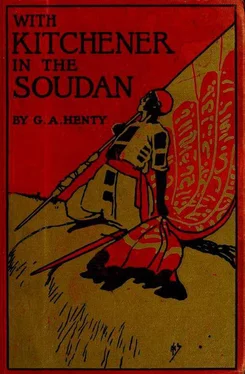It was dusk when they arrived at the bank of the river. No incident had marked the journey, nor had they seen any sign that Dervishes were in the neighbourhood. The Atbara was in full flood, and was rushing down at six or seven miles an hour.
" Colonel Parsons must have had great difficulty in crossing,
Zaki. He is hardly likely to have brought any boats across trom Kassala. I don't know whether he has any guns with him, but if he has I don't think he can have crossed, even if they made rafts enough to carry them."
They kept along the bank until they reached a spot where the river had overflowed. Here the camels drank their fill. A little grain was given to them, and then they were turned loose to browse on the bushes.
" There is no fear of their straying, I suppose, Zaki?"
"No, master; they are always turned loose at night. As there are plenty of bushes here they will not go far."
After another meal they both lay down to sleep, and as soon as it was light Zaki fetched in the camels and they continued their journey. In an hour they arrived at a village. The people were already astir, and looked with evident apprehension at the seeming Dervishes.
"Has a party of infidels passed along here?" Gregory asked the village sheik, who came out and salaamed humbly.
" Yes, my lord, a party of soldiers with some white officers came through here three days ago."
" How many were there of them ?"
" There must have been more than a thousand of them."
"Many more?"
"Not many; perhaps a hundred more. Your servant did not count them."
" Had they any cannon with them? "
" No, my lord; they were all on foot. They all carried guns, but there were no mounted men or cannon."
" Where is Fadil and his army that they thus allowed so small a force to march along unmolested ?"
"They say that he is still near the Nile. Two of his scouts were here the day before the Turks came along. They stayed here for some hours, but as they said nothing about the Turks coming from Kassala, I suppose they did not know they had crossed the river."
" Well, we must go on and see where they are. They must be mad to come with so small a force when they must have known that Fadil has a large army. They will never go back again."
Without further talk Gregory rode farther on. At each village through which they passed they had some news of the passage of Colonel Parsons' command. The camels had been resting from the time when Omdurman was taken, and having been well fed that morning Gregory did not hesitate to press them. The troops would not march above twenty-five miles a day, and two days would take them to Mugatta, so that if they halted there but for a day he should be able to overtake them that night. The character of the country was now greatly changed; the bush was thick and high, and a passage through it would be very difficult for mounted men. There was no fear, therefore, that they would turn off before arriving at Mugatta, from which place there would probably be a track of some sort to Gedareh. It was but a thirty-mile ride, and on arriving near the village Gregory saw that a considerable number of men were assembled there. He checked his camel.
" What do you make them out to be, Zaki? Your eyes are better than mine. They may be Colonel Parsons' force, and on the other hand they may be Dervishes who have closed in behind him to cut off his retreat."
" They are not Dervishes, master," Zaki said, after a long, steady look; " they have not white turbans. Some of their clothes are light, and some dark, but all have dark caps like those the Soudanese troops wear."
"That is good enough, Zaki. We will turn our robes inside out so as to hide the patches, as otherwise we might have a hot reception."
When they were a quarter of a mile from the village several men started out from the bushes, rifle in hand. They were all in Egyptian uniform. "We are friends!" Gregory shouted in Arabic. "I am an officer of the Khedive, and have come from Omdurman with a message to your commander,"
A native officer, one of the party, at once saluted. "You will find the bey in the village, bimbashi."
" How long have you been here?"
" We came in yesterday, and I hear that we shall start tomorrow, but I know not whether that is so."
"Are there any Dervishes about?"
" Yes; forty of them yesterday afternoon, coming from Gedareh and ignorant that we were here, rode in among our outposts on that hill to the west. Three of them were killed and three made prisoners; the rest rode away."
With a word of thanks Gregory rode on. He dismounted when he reached the village, and was directed to a neighbou^ , -ing hut. Here Colonel Parsons and the six Avhite officers with him were assembled. A native soldier was on sentry at the door.
"I want to speak to Parsons Bey." The Colonel, hearing the words, came to the door. " Colonel Parsons," Gregory said in English, "I am Major Hilliard of the Egyptian army, and have the honour to be the bearer of a message to you from General Rundle, now in command at Omdurman."
" You are well disguised indeed, sir," the Colonel said with a smile, as he held out his hand. " I should never have taken you for anything but a native. Where did you spring from! You can never have ridden, much less walked, across the desert from Omdurman?"
"No, sir; I was landed from one of the gun-boats in which General Hunter, with fifteen hundred Soudanese troops, is ascending the Blue Nile to prevent Fadil from crossing and joining the Khalifa."
"Have you a written dispatch?"
" It was thought better that I should carry nothing, so that even the strictest search would not show that I was a messenger."
"Is your message of a private character?"
"No, sir, I think not."
"Then will you come in?"
Gregory followed Colonel Parsons into the hut, which con tained but one room. " Gentlemen," the former said with a smile, "allow me to introduce Bimbashi Hilliard, who is the bearer of a message to me from General Rundle, now in command at Omdurman. Major Hilliard, these are Captain Mac-Kerrel, commanding four hundred and fifty men of the 16th Egyptians; Captain Wilkinson, an equal number of the Arab battalion; Major Lawson, who has under his command three hundred and seventy Arab irregulars; Captain the Hon. H. Ruthven, who has under him eighty camel-men; also Captain Fleming of the Royal Army Medical Corps, who is at once our medical officer and in command of the baggage column; and Captain Dwyer. They are all, like yourself, officers in the Egyptian army, and rank, like yourself, as Bimbashis. Now, sir, will you deliver your message to me?"
" It is of a somewhat grave character, sir, but General Rundle thought it very important that you should be acquainted with the last news. The Sirdar has gone up the White Nile with some of the gun-boats and the 11th Soudanese. He deemed it necessary to go himself, because a body of foreign troops—believed to be French—have established themselves at Fashoda."
An exclamation of surprise broke from all the officers.
" In the next place, sir, Fadil, who had arrived with his force within forty miles of Khartoum, has retired up the banks of the Blue Nile on hearing of the defeat of the Khalifa. Major-general Hunter has therefore gone up that river with three gun-boats and another Soudanese battalion to prevent him, if possible, from crossing it and joining the Khalifa, who is reported to be collecting the remains of his defeated army. It is possible—indeed the General thinks it is probable—that Fadil, if unable to cross, may return with his army to Gedareh. It is to warn you of this possibility that he sent me here. Gedareh is reported to be a defensible position, and therefore he thinks that if you capture it, it would be advisable to maintain yourself there until reinforcements can be sent to you, either from the Blue Nile or the Atbara. The place, it seems, is well supplied with provisions and stores, and in the event of Fadil opposing you, it would be far safer for you to defend it than to be attacked in the open or during a retreat."
Читать дальше












